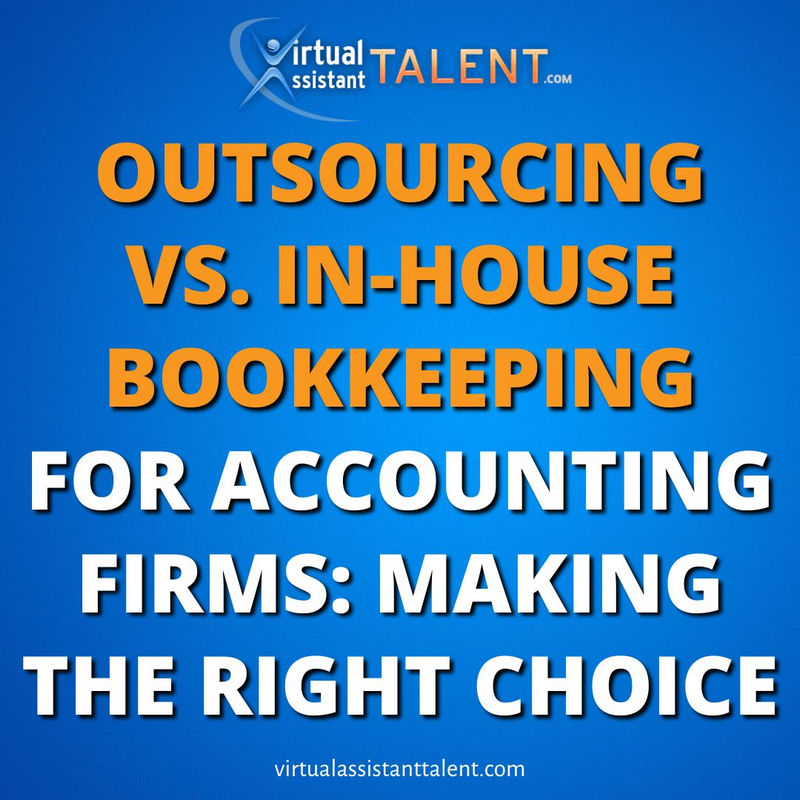
Understanding outsourcing and in-house bookkeeping
The Pros and Cons of Outsourcing Bookkeeping
The Pros and Cons of In-House Bookkeeping
Factors to consider when making the decision
Bookkeeping is a cornerstone upon which the entire financial framework is built upon.
However, the decision between outsourcing and in-house bookkeeping can be pivotal, significantly impacting an accounting firm’s efficiency, productivity, and bottom line.
In this comprehensive guide, we’ll delve deep into what outsourcing and in-house bookkeeping are, the pros and cons of each approach, and the vital factors you need to consider when deciding to help you make this critical decision with confidence.
Understanding outsourcing and in-house bookkeeping
Outsourcing bookkeeping
Outsourcing bookkeeping services is a popular choice for accounting firms nowadays. This is because external bookkeeping providers, also known as bookkeeping virtual assistants, can adjust their services according to the firm’s fluctuating needs—most probably a surge in workload during the tax season or scaling back during quieter periods. These varying needs allow accounting firms to use their resources efficiently through allocation to maximize productivity and reduce overhead costs.
Moreover, outsourcing bookkeeping allows accounting firms to tap into specialized expertise and technological advancements. Bookkeeping virtual assistants often boast a team of well-versed and seasoned professionals as they navigate the latest accounting practices and software solutions.
By leveraging such expertise, accounting firms can access insights and tools. It also removes the need to allocate budget and resources for training.
One of the best things about outsourced bookkeeping is that it offers objectivity and impartiality that may not exist with an in-house team. Bookkeeping virtual assistants can provide fresh perspectives and independent assessments, which help identify inefficiencies and improve the overall process.
However, despite its stellar advantages, that does not mean it has its own unique drawbacks. You cannot eliminate the concerns about data privacy, especially since you will be providing sensitive financial information to these service providers. Hence, it is crucial to thoroughly vet potential outsourcing partners and ensure they have formidable security measures to protect client data.
In-house bookkeeping
Conservatively, some accounting firms keep bookkeeping work in-house because they believe it offers control, customization, and integration with other internal processes.
In-house bookkeeping allows accounting firms to oversee and control financial data and processes internally. They can also tailor processes and workflows according to their needs.
Subsequently, in-house bookkeeping fosters a stronger sense of camaraderie and collaboration within the firm. By having bookkeeping functions performed by internal staff, team members can work closely together, share ideas, troubleshoot issues, and collectively contribute to the overall success of the accounting firm.
In-house bookkeeping also offers responsiveness and an agile workflow that external providers cannot match. For example, with outsourcing bookkeeping, you have to consider the turnaround time since the bookkeeping VAs may have their own timelines to follow.
With bookkeeping staff readily available on-site, accounting firms can request or address urgent requests, respond to client inquiries promptly, and adapt quickly to various circumstances or client needs.
Again, this side of the coin does not go without its own setbacks. Hiring and retaining a skilled bookkeeping staff can be time-consuming and costly. Moreover, internal bookkeeping operations may require significant investment in training and technology to ensure that they meet the demands of the accounting firm with efficiency and effectiveness.
The Pros and Cons of Outsourcing Bookkeeping
Outsourcing bookkeeping services can be a massive help for accounting firms, but it’s always essential to weigh these advantages against the potential drawbacks. Below are some of the pros and cons you need to ponder:
Pros
- Cost-savings
Outsourcing bookkeeping tasks to a bookkeeping virtual assistant can be cost-effective for accounting firms. By doing so, they can avoid the overhead costs of hiring and training in-house staff. Additionally, bookkeeping virtual assistants often work in countries with lower labor costs, which can significantly reduce expenses.
- Access to specialized expertise
If you want access to a pool of specialized expertise that may not be available with your in-house team, then hiring a bookkeeping virtual assistant is the way to go. Virtual assistant agencies, such as Virtual Assistant Talent, employ professionals with diverse skill sets and experience in various industries, mostly with degrees or backgrounds in accounting. They can give fresh perspectives and out-of-the-box solutions to your complex accounting challenges.
- Flexible and scalable
Finally, outsourcing offers scalability and flexibility to meet accounting firms’ various needs and demands. They can quickly scale bookkeeping services, whether up or down, in response to changes in client demand or business growth. Unlike the in-house team, you don’t have to pay the same salary even when less work is available. This agility ensures that firms can adapt to changing circumstances without the strain of hiring and managing in-house staff.
Cons
- Lack of direct control
One of the primary drawbacks of outsourcing is the lack of direct control over the bookkeeping process. Accounting firms must rely on outsourcing bookkeepers to perform tasks accurately and meet deadlines. While service-level agreements can help mitigate this risk, there is always a degree of uncertainty when you relinquish control to third parties.
- Data privacy and security concerns
Outsourcing bookkeeping involves sharing sensitive financial information with a third party, which can cause concern if you are not that careful. Accounting firms should be extra cautious when letting in outsourcing providers. Before hiring, you must check with the agency or the bookkeeping virtual assistant to see if they have robust data security measures.
- Communication barriers and challenges
Successful outsourcing relationships heavily rely on effective communication. However, communication challenges may arise, particularly in offshore outsourcing arrangements.
Three (3) factors that you need to consider are language barriers, time zone differences, and cultural differences. These elements can hinder effective communication between you and the bookkeeping virtual assistant.
To avoid this, establish clear communication guidelines and schedule regular check-ins to mitigate these challenges.
The Pros and Cons of In-House Bookkeeping
In-house bookkeeping offers accounting firms a level of control and immediacy that can be appealing, but it also comes with its challenges. Let’s explore its advantages and disadvantages:
Pros
- Direct control and oversight
With in-house bookkeeping, firms have direct control and oversight over the entire process. This allows for greater transparency, customization of bookkeeping practices to address needs and accountability,
- Immediate responsiveness and action
In-house bookkeepers are readily available to address any issues or concerns that may arise, unlike bookkeeping virtual assistants, who, as mentioned earlier, have a turnaround time and timeline to go through. This immediate responsiveness ensures the timely resolution of accounting discrepancies or client inquiries, which upholds client satisfaction and retention.
- Smooth integration with other accounting functions
If you want a more seamless integration of internal accounting processes, in-house bookkeeping is the way to go. It helps facilitate collaboration and communication between departments, creating more efficient workflow processes.
Cons
- Costly
One of the primary drawbacks of in-house bookkeeping is the higher costs associated with hiring and maintaining a dedicated team of bookkeepers. Expenses include salaries, benefits, training, and overhead costs, which can significantly impact the firm’s bottom line, especially for smaller firms or those operating on tight budgets.
- Limited expertise and experience
In-house bookkeepers may have limited expertise compared to outsourcing providers specializing in bookkeeping services, such as bookkeeping virtual assistants. This can result in gaps in knowledge or skills, particularly in areas of complex accounting or industry-specific regulations. This may potentially lead to errors or compliance issues.
- Resource constraints in the long run
In-house bookkeeping may face resource constraints, especially during peak periods or staff shortages. This can result in delays in processing financial transactions, meeting deadlines, or providing timely support to clients.
Without sufficient backup resources or contingency plans, firms may struggle to maintain consistency and efficiency in their bookkeeping operations.
Factors to consider when making the decision
When deciding between in-house bookkeeping and outsourcing, accounting firms should consider several factors to ensure they make the most suitable choice for their business. Here are the factors to contemplate:
- Size and scale of the accounting
The size and scale of the accounting firm play a significant role in determining whether in-house bookkeeping or outsourcing is the better option. Larger firms with ample resources may opt for in-house bookkeeping to maintain control and oversight, while smaller firms may find outsourcing more cost-effective and practical.
- Budget
Budget considerations are paramount when deciding between in-house bookkeeping and outsourcing. In-house bookkeeping typically entails higher costs due to salaries, benefits, and overhead expenses. On the other hand, outsourcing allows firms to pay for bookkeeping services as needed, reducing fixed costs and providing greater flexibility, making it a more viable option for firms operating on tight budgets.
- Availability of expertise within the team
The availability of in-house expertise is crucial in determining whether to keep bookkeeping in-house or outsource it.
If the accounting firm has skilled and knowledgeable bookkeeping staff capable of effectively handling all aspects of the job, in-house bookkeeping may be the preferred choice.
However, outsourcing may be a more practical solution if expertise is lacking or additional resources are needed to meet client demands.
- Client preferences and expectations
Accounting firms must consider their clients’ preferences and expectations when deciding on bookkeeping practices. Some clients may value the personal touch and direct communication offered by in-house bookkeeping, while others may prioritize the cost-effectiveness and efficiency provided by outsourcing.
Understanding client preferences and aligning bookkeeping practices with their expectations is essential for maintaining strong client relationships and satisfaction.
- Long-term Strategic Goals
Finally, accounting firms must consider their long-term strategic goals when making decisions about bookkeeping practices. Outsourcing bookkeeping may offer short-term cost savings and flexibility. Still, in-house bookkeeping may provide greater control and customization options that align with the firm’s long-term growth and expansion plans. Firms should assess how bookkeeping decisions fit into their broader strategic objectives and choose the option that best supports their future vision.
Final Thoughts
Ultimately, the decision between outsourcing and in-house bookkeeping should be guided by the unique needs, priorities, and resources of each accounting firm.
Some firms may benefit from the flexibility, expertise, and cost savings offered by outsourcing, while others may prefer the control, integration, and responsiveness of in-house bookkeeping.
In conclusion, outsourcing and in-house bookkeeping have merits and drawbacks, and there is no one-size-fits-all solution.
Accounting firms must carefully weigh the advantages and disadvantages of each approach and consider factors such as cost, expertise, control, and scalability when making this critical decision.
By taking a thoughtful and strategic approach, accounting firms can optimize their bookkeeping operations and position themselves for long-term success.
Are you looking for a bookkeeping assistant with diverse skill sets and experience in various industries and accounting software?
Are you looking for a genuine partner who can give you fresh perspectives and out-of-the-box solutions to your complex accounting challenges?
You don’t have to look far. Virtual Assistant Talent has a pool of readily available bookkeeping virtual assistants who can help you.
Resources:
https://www.growthforce.com/blog/in-house-vs-outsourced-bookkeeping-accounting
https://www.dvphilippines.com/blog/in-house-vs.-outsource-accounting-the-difference
https://www.decimal.com/blog/in-house-vs-outsourced-accounting

